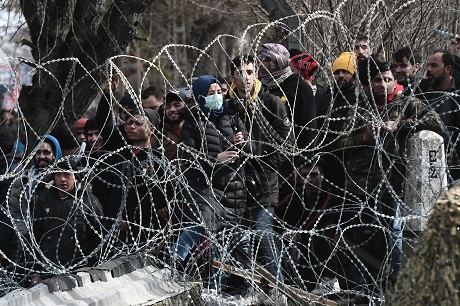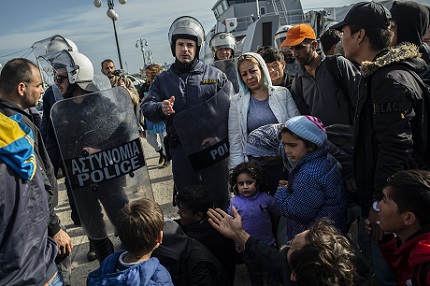
A wounded Syrian child sits inside a vehicle as he is evacuated from the scene of an air strike in the town Maarrat of Misrinn Idlib, on February 25, 2020. Photo: Abdulaziz Ketaz / AFP
ERBIL, Kurdistan Region - Saraqeb was once a symbol of the Syrian revolution – encompassing its hopes, failures, degeneration, and destruction. Throughout the years, its residents have protested the Assad regime, as well as the extremists who tried to take over with their dogmatic ideology.
Far flung from the capital Damascus, in the northwest province of Idlib, Saraqeb is once again at the center of a war, long cold and ignored, that has taken a dramatic turn in recent days. The raising of the two-starred flag of Assad’s Syria triggered an uncharacteristic escalation between the warring powers, Russia and Turkey, and captured an unwilling Europe’s attention to the burden of its refugees.
With the Syrian war grinding into a tenth year of stalemate, it has taken merely days to shake up the status quo.
On the Greek border, images of refugees flooding television screens – reminiscent of 2015, when the excesses of the Syrian war reached Europe’s doorstep – have sent its leaders into a panic. After years of threatening to do so, Turkey a green light for refugees to head to Europe, sparking a rushed exodus with Greece. Greek politicians call it an “invasion” – the EU migration chief calls it “blackmail.”

The makeshift refugee camp newly minted on Europe’s frontier numbers a fraction of those trying to make it out of Syria. Across the border in Idlib, the chessboard has been dramatically flipped. For years, cities in rebellion against Syrian President Bashar al-Assad have been pounded by regime and Russian fighter jets. The rebels never had an air force to defend themselves. With the late entry of Turkey, they now do.
How did it come to this?
Just weeks ago, the top UN negotiator for Syria warned of a “catastrophe” in Idlib: more people were displaced in a short period of time than any other point in the war – over 950,000 in just two months.
“The only thing that we dream about is being safe from the sound of bombs – but once in a while I dream about my home, Saraqeb,” says Fawaz Aslan, a 60-year-old retired philosophy instructor.
Saraqeb is a key prize not just symbolically, but militarily. Just days after it fell to Assad’s forces on February 6, the stalemate began unraveling. As rebel factions backed by Turkey closed in for a counterattack, an airstrike killed 33 Turkish soldiers embedded with the rebels.
Aslan counts himself lucky – he has only had to leave his home and all its memories once in this war. In these freezing winter months, Idlib is home to many who were displaced two, three or four times from areas retaken by Assad’s forces. Each time, they took only what they could carry with them on the hated green buses – commandeered from Damascus’ public transportation for military evacuation. Most people have burned their extra clothes for warmth, and make beds out of plastic bags, because mattresses frost over at night.
“Death is all around us, and we have no other place to go,” says Aslan. “Here, we say that there is no Idlib after Idlib.”
Before it stopped counting in 2016, the UN last estimated the death toll in Syria at over 400,000. It took only the televised image of caskets wrapped in the red Turkish flag to swiftly bring down Syrian fighter jets, and a cavalcade of hardware of death.

Diplomatic Panic
A scuffle of diplomacy ensued, and Turkish President Recep Tayyip Erdogan threatened that if Turkish soldiers are targeted, the gloves would come off.
Although they back opposite sides of the conflict, Erdogan and Putin have found much to cooperate on in trade, gas pipelines, and weapons deals. In late 2018, peace talks in Sochi, Russia had succeeded where previous attempts in Geneva and Astana had failed, and established joint observation points in Idlib, monitored jointly by Turkey and Russia.
The deal was supposed to avoid major confrontation in Idlib that would inevitably result in a bloodbath of civilians kenneled in from other areas retaken by Assad’s forces. Russia agreed to hold off Assad’s long-awaited push to retake Idlib from rebels now dominated by hard-line Islamists, while Turkey would put pressure on the rebels to separate out the moderate factions which it backs, from extremists.
“It never happened,” says Alexey Khlebnikov, an analyst at the Russian International Affairs Council. “All of the actors in Syria, especially Turkey and the Syrian government, have been on a collision course that every move up to this point has brought us to,” Khlebnikov told Rudaw English.
That may change, as Russia has stepped up the stakes, stationing its own military police in Saraqeb – a clear deterrent to Turkey-backed rebels that fierce retaliation is in store if its soldiers are attacked. “Neither Moscow nor Ankara is interested in an escalation,” Khlebnikov told Rudaw.
Unkept Promises
But on the other side, Syrians already in Turkey are rushing to leave. Just hours after officials in Ankara suggested Turkey would finally make good on threats long-directed at Europe to open the gates to allow refugees through, Syrians began filling buses departing Istanbul, headed for the Greek border. Turkey has long protested that it bears too much of the Syrian war’s burden, and that European nations have failed to do their part.

“Turkey’s decision to open its borders with Europe is a tactic to pressure the EU for support in Idlib,” said Sinem Adar, a researcher on Turkey at the German Institute for International and Security Affairs. “Ankara’s deployment of refugees as a bargaining chip against the European Union is in fact a direct outcome of the EU’s externalization policies.”
Those who left the lives they were starting to build in Turkey have arrived at Europe’s gates to find confusion and disappointment at the border. The UN refugee agency has estimated some 20,000 people are now massed along the 200-kilometre (125-mile) border with Turkey.
One of them, Mohammed Nuri, told a Rudaw reporter that even though there is no war in Turkey, opportunities are thin and discrimination is widespread. “We want to leave," said Nuri. “I've been living in Turkey for three years. No matter how much we work, it's useless and we have no future here."
Among the Syrian community in exile, some have praised Erdogan’s gambit with Europe as a bold move to pressure Europe to put up its fair share. Left without allies and used in political moves, Syrians are left with few choices of fate.
“Syrians are a bargaining chip,” activist Rami Jarrah told Rudaw in a telephone interview. “We’re sort of stuck in the middle between welcoming what Turkey did, and realizing that Turkey acting all of a sudden after nine years of war is not because Syrians are being murdered, it’s because Turkish soldiers were killed [...] We’re desperate right now. Will we accept something from someone we don’t like? I just don’t have the gut to put up an argument right now,” Jarrah said.
Last updated March 5, 2020 at 5:30 PM








Comments
Rudaw moderates all comments submitted on our website. We welcome comments which are relevant to the article and encourage further discussion about the issues that matter to you. We also welcome constructive criticism about Rudaw.
To be approved for publication, however, your comments must meet our community guidelines.
We will not tolerate the following: profanity, threats, personal attacks, vulgarity, abuse (such as sexism, racism, homophobia or xenophobia), or commercial or personal promotion.
Comments that do not meet our guidelines will be rejected. Comments are not edited – they are either approved or rejected.
Post a comment